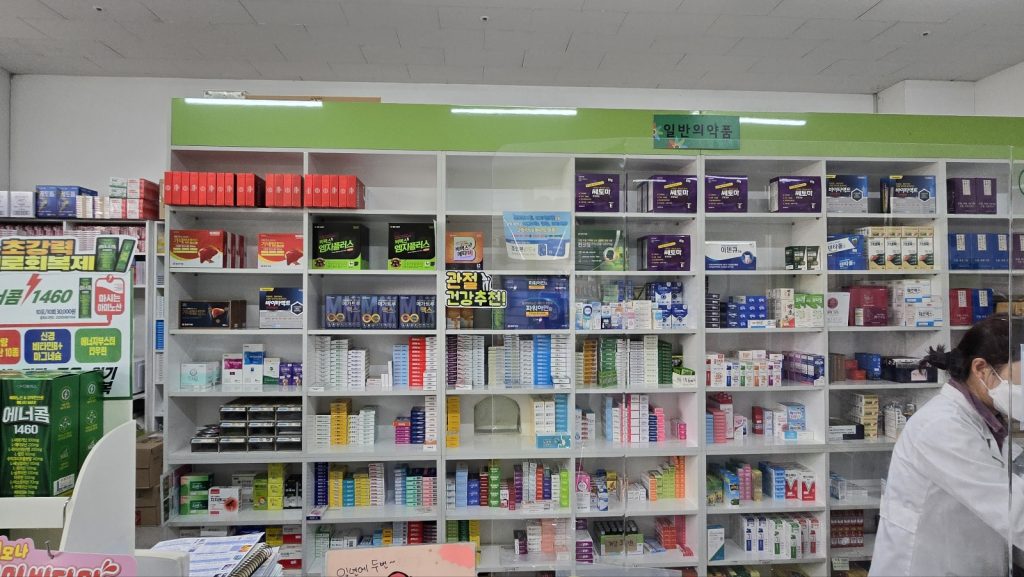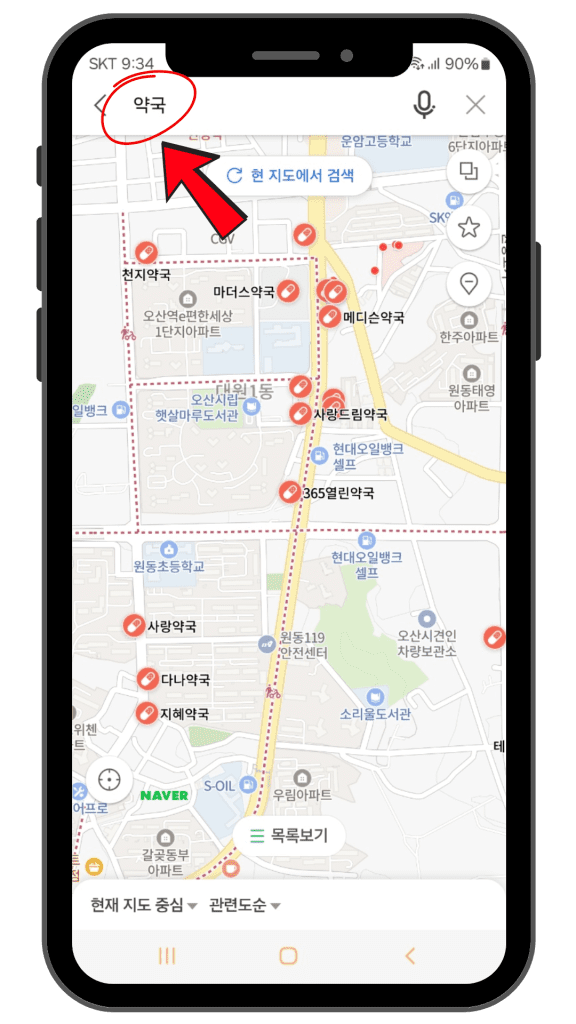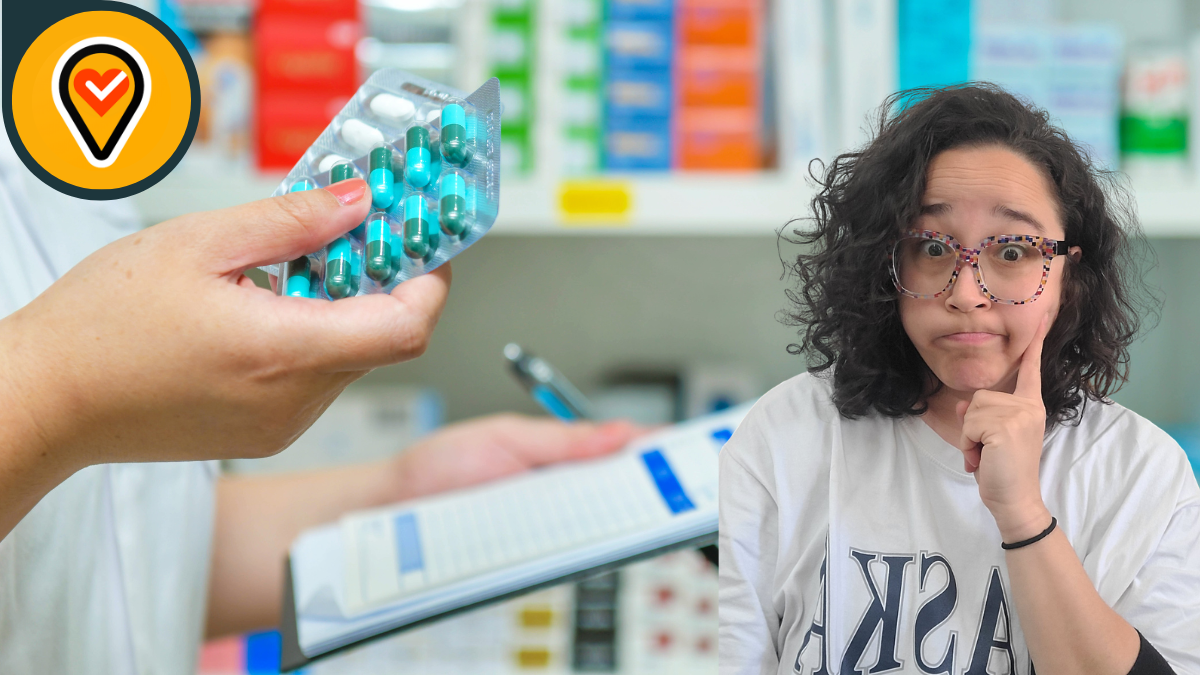When living in South Korea, understanding how to find over-the-counter (OTC) medicine might feel a bit daunting at first. Pharmacies (약국, yakguk) are the main place to go for most OTC medications. However, the availability and process may differ slightly from what you’re used to in your home country. This blog post provides an overview of commonly used OTC medications in Korea and products and tips for finding what you need.
While we hope this guide helps you get started, please remember that pharmacists and doctors should always be your primary source of information regarding your health.
Listen to the BlogCast
Don’t want to read? Listen to the South of Seoul BlogCast which provides accessible content through the use of AI technology. We don’t have time to read each article but we do our best to make more of our content accessible. If you would like to join our Accessibility Team apply to volunteer with South of Seoul.
How Do Pharmacies Work in Korea?
Pharmacies in South Korea operate a bit differently from some other countries. Let’s take a look at some of the common areas points of culture shock for international residents when they first use Korean pharmacies:
Medicines Behind the Counter
Instead of browsing aisles for what you need, the pharmacist keeps pharmaceutical medications behind the counter (pictured below) and gets what you need on request. That’s right, in Korea, many pharmaceutical medicines are not displayed on open shelves where you can pick them up like in some other countries. This includes common OTC products like pain relievers, cold medicine, and even bandages in some cases. Vitamins are often available to browse, but not pharmaceuticals. To get OTC medications, you can either ask the pharmacist for a specific medication or you can describe your symptoms to them and ask what they recommend.

Language Barrier
Once again, you must communicate directly with the pharmacist (약사) even if you don’t speak Korean. Thankfully, many pharmacists (약사) understand some English and a surprising amount even speak English. However, if they do not, translation apps like Papago or Google translate exist to help you with direct translation. Or, for more specific support utilize AI tools like the South of Seoul AI Intern (look for the dialogue icon in the bottom right of this blog post) or Chat GPT.
Different Perscriptions Requirements
Some OTC medicines in other countries may not be OTC in Korea and require a prescription. Additionally, some medications which are prescribed in other countries may be OTC in Korea. You need to do your research on how to access the medications you require. This could include visiting a local doctors office.
Korean Medicine Alternatives
Some pharmacists are trained in both Western and Traditional medications. This means they offer both pharmaceutical and traditional OTC medicine options. If you offer up your symptoms, they may ask you which type of medication you prefer.
Corporate Affiliations
Keep in mind that clinics and pharmacies have relationships with certain drug manufacturers. For the purpose of OTC medications, this means that not every pharmacy offers the exact same brands of medications.
Locations
Pharmacists can be found near medical facilities in most neighborhoods in South Korea. Look for the green or red cross sign with the Korean word “약” (pictured below) in your neighborhood to find a pharmacy nearby. Sometimes it feels hard to find a pharmacy at first when you aren’t used to looking for the term 약.

Often Closed on Sundays
Although this is slowly changing, most pharmacies are closed on Sundays and some are closed all weekend. Especially in quieter or more rural areas. Look on Naver to find pharmacy hours and to find the closest one to you that is open.
Are Brand-Name Medicines the Same Across Countries?
You may notice familiar brand-name medicines like Tylenol (타이레놀) and Zyrtec (지르텍) on pharmacy shelves in Korea. However, just because you can’t find the brand name it doesn’t mean they don’t have the medication. You may simply need to ask for the primary active ingredient in order to find a reliable alternative. For example, if you wanted to find Pepcide AC, you would look for 파모티딘 (Famotidine). You can use ChatGPT to find the generic names of brand name medications. Such alternative medicines generally contain the same active ingredients as their U.S. counterparts.
Presentation
Some differences in the presentation of OTC medications may exist in Korea. This can feel uncomfortable at first. Such differences could include packaging (often blister packs instead of bottles), dosage amounts, number of pills packaged together, and availability can vary.
For example, in South Korea, Tylenol dosages start at 500mg but in the US the over-the-counter dosage starts at 325mg so you need to read dosages carefully. Know what dosages you generally take and how they might differ in Korea to avoid overdose issues.
More Generics
Korean pharmacists may also recommend generic alternatives or local brands, which can often be more affordable. If unsure, ask for the medicine by its active ingredient or consult the pharmacist for the closest equivalent. For unique medicines or specific formulations (e.g., extended-release), it can be helpful to bring a small supply from home. Have your language tools such as Papago ready if you don’t speak Korean.
To help you get comfortable with your search, let’s learn what OTC medicines and products are available in Korea.
Common Over-the-Counter Medicines
Below are examples of OTC medicines found in South Korea that you might find helpful. Keep in mind, this list is not comprehensive. Cost, availability, and brand names may vary between pharmacies.
OTC Pain Relievers and Fever Reducers (진통제, jintongje)
Pain relievers are some of the most frequently used OTC medications for headaches, minor pains, or fevers. The most commonly used pain relievers found in pharmacies are listed below.
| Name (Korean) | Use | Cost Range | Prescription Needed? |
|---|---|---|---|
| *Tylenol (타이레놀) | Pain, fever relief | ₩2,000–₩5,000 | No (higher doses: Yes) |
| Ibuprofen (이부프로펜) | Pain, inflammation relief | ₩2,000–₩5,000 | No (higher doses: Yes) |
| Aspirin (아스피린) | Pain, fever relief | ₩2,000–₩4,000 | No |
*Some pain relievers, such as Tylenol, may also be found at your local convenience store.
Considerations:
- For stronger doses of ibuprofen or Tylenol (e.g., Tylenol 650 mg), a prescription may be necessary.
- If unsure, you can describe your symptoms to the pharmacist, and they may recommend a suitable option.


OTC Cold and Flu Medicines (감기약, gamgiyak)
If you’re dealing with cold or flu symptoms, there are OTC combination medicines available that address multiple symptoms.
| Name (Korean) | Use | Cost Range | Prescription Needed? |
|---|---|---|---|
| Penzal Q (펜잘큐) | Headaches, fatigue, mild colds | ₩4,000–₩8,000 | No |
| Panpyrin (판피린) | General cold and flu symptoms | ₩5,000–₩8,000 | No |
| Decolgen (데콜진) | Nasal congestion, cold relief | ₩4,000–₩6,000 | No |
Considerations:

Image Source: https://namu.wiki
OTC Digestive Aids (소화제, sohwaje)
For minor stomach discomfort or digestion issues, OTC digestive aids can be very useful.
| Name (Korean) | Use | Cost Range | Prescription Needed? |
|---|---|---|---|
| Buscopan (부스코판) | Stomach cramps | ₩4,000–₩6,000 | No |
| Gas Pills (가스활명수) | Indigestion, bloating relief | ₩4,000–₩8,000 | No |
| Probiotics (프로바이오틱스) | Gut health support | ₩10,000–₩30,000 | No |
Considerations:
- If you are sensitive to new foods, digestive aids might help you adjust to Korea’s diverse cuisine.

Image Source: https://www.dailypharm.com
OTC Antihistimines (항히스타민제, hanghistaminje)
South Korea experiences significant seasonal changes, so OTC allergy medications can be helpful for managing symptoms. There are also numerous less expensive Korean brands that have the same ingredients and results.
| Name (Korean) | Use | Cost Range | Prescription Needed? |
|---|---|---|---|
| Zyrtec (지르텍) | Sneezing, rash relief | ₩6,000–₩10,000 | No |
| Clarityn (클라리틴) | Non-drowsy allergy aid | ₩6,000–₩10,000 | No |
| Xyzal (지르텍 D) | Severe allergy relief | ₩6,000–₩12,000 | Sometimes |
Considerations:
- You can ask for “알레르기 약” (allergy medicine) to describe your needs.


OTC Birth Control (피임약, pi-imyak)
Birth control is available OTC without a prescription in South Korea, but emergency contraception requires a doctor’s approval.
| Name (Korean) | Use | Cost Range | Prescription Needed? |
|---|---|---|---|
| Regular Pills (머시론) | Prevent pregnancy | ₩6,000–₩15,000 | No |
| Emergency Contraception (사후 피임약) | After unprotected intercourse | ₩20,000–₩40,000 | Yes |
| Condoms (콘돔) | STI prevention, contraception | ₩5,000–₩15,000 | No |
Considerations:
- For emergency contraception, visit a nearby OB-GYN (산부인과) or hospital quickly, as timing is essential.

Image Source: https://blog.naver.com
OTC Pregnancy Tests (임신 테스트기, imsin teseuteugi)
Pregnancy tests are a common OTC product sold at pharmacies and convenience stores.
| Name (Korean) | Use | Cost Range | Prescription Needed? |
|---|---|---|---|
| Generic Pregnancy Tests (임신 테스트기) | Detect pregnancy | ₩2,000–₩10,000 | No |
Considerations:
- Pregnancy tests are often located near the counter at pharmacies for convenience.

Image Source: https://www.11st.co.kr
Finding a Pharmacy (약국, yakguk)
If you need help finding a pharmacy, Naver Maps (네이버 지도) is one of the best tools to use.
- Open the app and copy/paste 약국 (yakguk) in the Naver search bar.
- Add your location or neighborhood for more specific results (e.g., “신장동 약국” for Sinjang-dong pharmacies).
- For 24-hour pharmacies, search “24시 약국.”
- For late-night pharmacies search “심야 약국.”

Final Considerations
Pharmacies in South Korea are reliable, affordable, and well-stocked with options for minor health concerns. However, availability may differ depending on the pharmacy, and some items might require a prescription even if they’re OTC in your home country. If you’re ever unsure, don’t hesitate to ask the pharmacist for advice.
As always, if symptoms persist or worsen, please visit a doctor or hospital for professional care.
Follow SOS Public Health for More Resources
Follow us on Instagram or Facebook to stay updated on SOS Public Health Initiatives. If you have questions about healthcare in Korea, visit the Health and Wellness in Korea Facebook Group, or feel free to message SOS Public Health with any questions or concerns.


Ms. Peck graduated from the University of Utah Asia Campus (UAC) in Incheon with a Master’s in Public Health and her Certification in Public Health (CPH). Ms. Peck also holds a Bachelor’s Degrees in Linguistics and one in International Studies with a Global Health emphasis.
Ms. Peck is Korean American and speaks both English and Korean. She has moved between the US and Korea since childhood, finally settling in Korea after graduating from UAC.
In 2021 Ms. Peck founded the South of Seoul Public Health Program which focuses on research and initiatives regarding the health and wellness of multinational residents in South Korea.
Additionally, Ms. Peck oversees the SOS Public Health Graduate Student Practicum Program which provides mentorship and training for Master’s in Public Health students. The program works with two students a semester with a focus on ethical UX research design, survey development, and initiative implementation.




